Unit1 Where
Unit1--Where-did-you-go-on-vacation
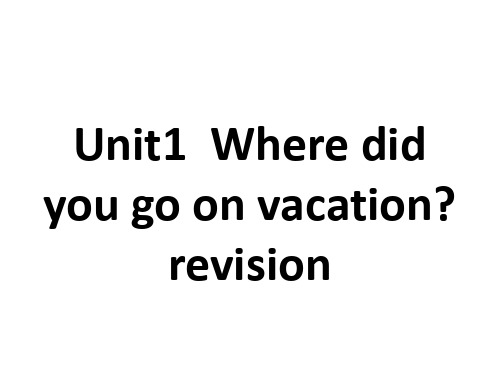
The songs sound beautiful.这些歌曲听起来 很优美。
过得高兴,玩得愉快
have a good\great\fun time (=enjoy oneself)
They had a good time yesterday.= They enjoyed themselves yesterday.
find—found找到
2.不定代词和不定副词的用法
some
body
any
one
every thing
no
where(疑问副
词)不定代词和不定副词
(1)左边的some、any、every、no与右 边的body、one、thing构成不定代词, some、any、every、no与右边的疑问副 词where构成不定副词;
2. 回顾一下在3b中所回答的问题的情况,然后 将这些句子按恰当的逻辑顺序排列在一起, 形成条理清晰的一段文字。
3. 可根据旅行经历再加一些恰当想像的句子。 4. 再次,阅读一遍短文,看有没有错误的句
子。
假如你和你的家人在四月八号这天参观了北 京,请你以日记的形式把这天的经历及感受 记录下来。 提示:1. 早上:参观颐和园(爬万寿山;在 昆明湖划船) 2. 中午:吃北京烤鸭 3. 下午: 逛王府井大街 参考词汇:颐和园 the Summer Palace; 万寿山 Longevity Hill;昆明湖Kunming Lake;王府井大街 Wangfujing Street;风 景 scenery
1. 定基调 体裁:应用文(日记);日记的主体部分为 记叙文 时态:谈过去的经历时,用一般过去时。 人称:写个人经历时,用第一人称。
2013年八年级英语上册-Unit-1-Where-did-you-go-on-vacation-Section-A-3a-3c.
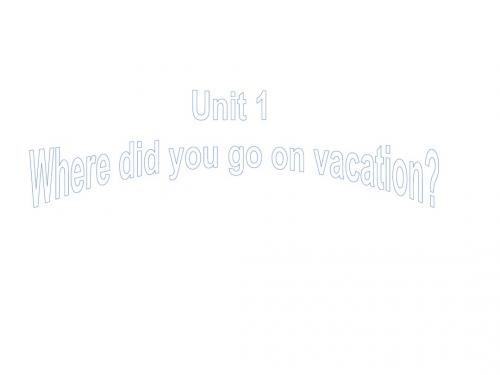
他自己 她自己 它自己
ourselves yourselves
themselves
我们自己 你们自己
他们自己
1. Did you buy anything for yourself? 你为你自己买什么东西了吗?(做介词宾语) 2. The old man taught himself English. 那位老人自学英语。(做动词宾语)
1. 你去了什么地方去度假? _W__h_e_r_e __d__id__ you go on _v_a_c_a_t_io_n__? 2. 我去了纽约市。 I _w_e_n_t___ _t_o__ New York City. 3. 你和别的什么人一起去的吗? _D_i_d___ _y_o_u___ go out with _a_n_y_o_n_e__?
( ) 1. I’m hungry. I want ___B___ to eat. A. anything B. something
C. everything D. nothing
( ) 2. —Do you have __D____ to say for yourself?
—No, I have ______ to say.
smell: 闻起来 ~ sweet
look:看起来 ~ beautiful/handsome/cute
sound: 听起来 ~ good/wonderful feel:摸起来 ~cold/warm/soft(软)
感官动词(系动词)+ 形容词
2.have a good time: 玩的开心、过得愉快
问题是李雪鹏没有钱。
The problem is that Li Xuepeng has no money. 唯一的问题是今天的报纸上没有什么有趣的东西。
Unit 1 Where did you go on vacation知识点归纳及练习
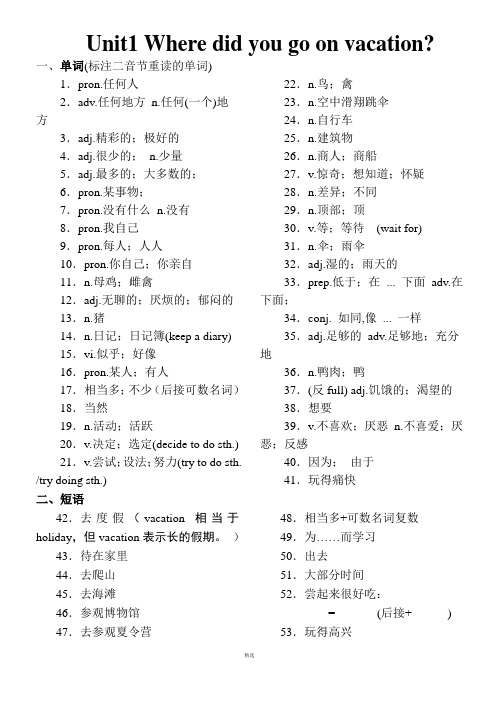
Unit1 Where did you go on vacation?一、单词(标注二音节重读的单词)1.pron.任何人2.adv.任何地方n.任何(一个)地方3.adj.精彩的;极好的4.adj.很少的;n.少量5.adj.最多的;大多数的;6.pron.某事物;7.pron.没有什么n.没有8.pron.我自己9.pron.每人;人人10.pron.你自己;你亲自11.n.母鸡;雌禽12.adj.无聊的;厌烦的;郁闷的13.n.猪14.n.日记;日记簿(keep a diary)15.vi.似乎;好像16.pron.某人;有人17.相当多;不少(后接可数名词)18.当然19.n.活动;活跃20.v.决定;选定(decide to do sth.)21.v.尝试;设法;努力(try to do sth. /try doing sth.)22.n.鸟;禽23.n.空中滑翔跳伞24.n.自行车25.n.建筑物26.n.商人;商船27.v.惊奇;想知道;怀疑28.n.差异;不同29.n.顶部;顶30.v.等;等待(wait for)31.n.伞;雨伞32.adj.湿的;雨天的33.prep.低于;在... 下面adv.在下面;34.conj. 如同,像... 一样35.adj.足够的adv.足够地;充分地36.n.鸭肉;鸭37.(反full) adj.饥饿的;渴望的38.想要39.v.不喜欢;厌恶n.不喜爱;厌恶;反感40.因为;由于41.玩得痛快二、短语42.去度假(vacation相当于holiday,但vacation表示长的假期。
)43.待在家里44.去爬山45.去海滩46.参观博物馆47.去参观夏令营48.相当多+可数名词复数49.为……而学习50.出去51.大部分时间52.尝起来很好吃:= (后接+ ) 53.玩得高兴54.当然55.给……的感觉;感受到:(后接+ )56.去购物57.在过去58.四处走走59.一碗…… 60.喝茶61.找出;查明62.继续63.去旅行64.照相65.上上下下66.出来;出版三、重点句式1.你买特别的东西了吗?Did you buy ?2.所有的东西尝起来真的很好吃!Everything tasted !3.你去哪里度假了?4.我为爸爸买了一些东西。
unit-1-Where-did-you-go-on-vacation知识总结
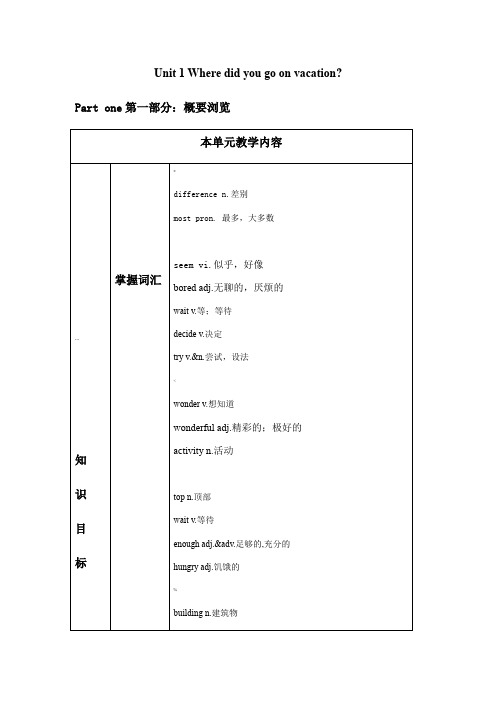
Unit 1 Where did you go on vacation? Part one第一部分:概要浏览)Part two 第二部分;知识点详解单词与短语讲解(一)quite a few的用法a few 意为“一些,若干(=some)”,后跟可数名词复数形式。
quite a few 意为“相当多;不少(=many)”后跟可数名词复数形式。
We took ____ ____ _____ _____ in the park last weekend.上周末,我们在公园里拍了相当多的照片。
【拓展】:few/a few/quite a few/little/a little/quite a little的用法1.most + 名词泛指多数,无范围most students大部分学生2.most + of + the (this/that/those/these等)+名词,指某一范围内的多数。
______ _____ _______students go to school by bike.这些学生们中的多数骑自行车去上学。
;(三)seem的用法seem“好像”,既可以后跟___________,又可以后跟___________。
【活学活用】1.The pig seems ___________(healthy/ healthily).2.Tom seemed ___________(know/ to know) the test result.3.I seem__________(have)a cold【拓展】(1.It seems+that从句看起来好像…;似乎….It seems that he is happy.=He seems _____ _____ happy. 他似乎很快乐。
2.seem like….好像,似乎…..It seems like a good idea.它似乎好像一个好主意。
(人教版)2020八年级英语上册 Unit 1 Where did you go on vacation讲义+习题 (新版)人教新目标版

Unit1. Where did you go on vacation因为19.one bowl of… 一碗…… 20.the next day 第二天21.drink tea喝茶22.find out找出;查明23.go on继续24.take photos照相25.something important重要的事 26.up and down上上下下27.have a good time玩得高兴=enjoy oneself=have (great) fun1.与seem有关的句式1)seem + 形容词“看起来…..” You seem happy today.2)seem + to do sth. “似乎、好像做某事” I seem to have a cold3)It seems / seemed + 从句“看起来好像…;似乎…”. It seems that no one believe you.4)seem like ….“好像,似乎…..” It seems like a good idea.2. too many,too much,much too1)too many “太多”,后接可数名词复数。
如:Mother bought too many eggs yesterday.2)too much “太多”,修饰不可数名词或修饰动词作状语。
如:3)much too “太”,修饰形容词或副词。
如:小结:分辨三者的口诀: too much, much too, 用法区别看后头: much 后接不可数, too 后修饰形或副。
too many 要记住,后面名词必复数。
7. because:1)because of 介词短语,“因为,由于”,后接名词、代词或动名词,不能接句子。
如:H e can’t take a walk because of the rain.2)because 连词,“因为”,引导状语从句,表示直接明确的原因或理由。
Unit-1--Where-did-you-go-on-vacation-知识点汇总
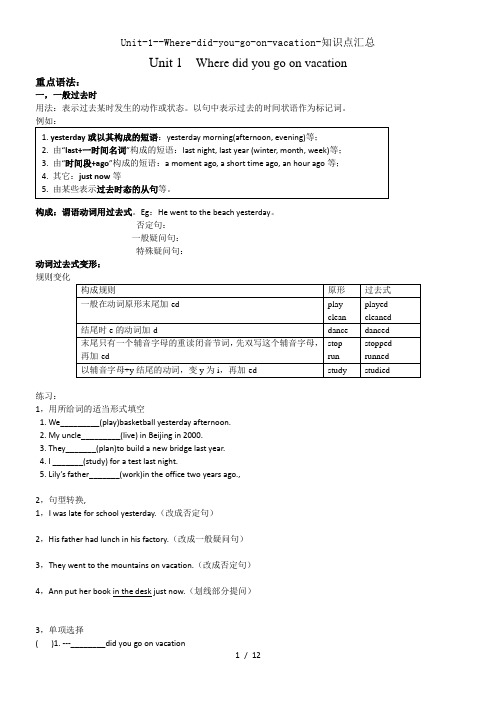
Unit 1 Where did you go on vacation 重点语法:一,一般过去时用法:表示过去某时发生的动作或状态。
以句中表示过去的时间状语作为标记词。
例如:构成:谓语动词用过去式。
Eg:He went to the beach yesterday。
否定句:一般疑问句:特殊疑问句:动词过去式变形:规则变化练习:1,用所给词的适当形式填空1. We_________(play)basketball yesterday afternoon.2. My uncle_________(live) in Beijing in 2000.3. They_______(plan)to build a new bridge last year.4. I _______(study) for a test last night.5. Lily’s father_______(work)in the office two years ago.,2,句型转换,1,I was late for school yesterday.(改成否定句)2,His father had lunch in his factory.(改成一般疑问句)3,They went to the mountains on vacation.(改成否定句)4,Ann put her book in the desk just now.(划线部分提问)3,单项选择( )1. ---________did you go on vacation---Hong Kong.A. WhatB. HowC. WhereD. When( )2. I_____my homework last night. I went to the cinema with my parents.A. didB. didn’tC. didn’t doD. don’t do( )3. ---Did they clean the house yesterday afternoon---_________. They cleaned it this morning.A. No, they don’tB. Yes, they didC. No, they didn’t C. Yes, they do( )4. ---_____Tom and Jim_____a walk yesterday evening---No, they____.A. Do; take; doesn’tB. Did; take; didn’tC. Did; take; didD. Do; take; don’t ( )5. ---The coat looks good on you. Where______you______it---In a supermarket.A. do; buyB. did; buyC. will; buyD. does; buy二、复合不定代词Did you go with anyone Did you find anything special用法:1,作主语时,谓语动词用单数Everone (be)here.2, 被形容词修饰时,形容词必需后置。
Unit_1_where_did_you_go_on_vacation知识点详解
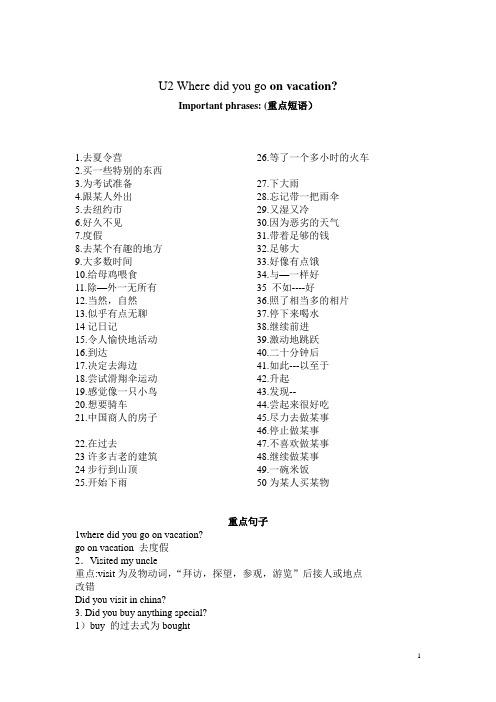
U2 Where did you go on vacation?Important phrases: (重点短语)1.去夏令营2.买一些特别的东西3.为考试准备4.跟某人外出5.去纽约市6.好久不见7.度假8.去某个有趣的地方9.大多数时间10.给母鸡喂食11.除—外一无所有12.当然,自然13.似乎有点无聊14记日记15.令人愉快地活动16.到达17.决定去海边18.尝试滑翔伞运动19.感觉像一只小鸟20.想要骑车21.中国商人的房子22.在过去23许多古老的建筑24步行到山顶25.开始下雨26.等了一个多小时的火车27.下大雨28.忘记带一把雨伞29.又湿又冷30.因为恶劣的天气31.带着足够的钱32.足够大33.好像有点饿34.与—一样好35 不如----好36.照了相当多的相片37.停下来喝水38.继续前进39.激动地跳跃40.二十分钟后41.如此---以至于42.升起43.发现--44.尝起来很好吃45.尽力去做某事46.停止做某事47.不喜欢做某事48.继续做某事49.一碗米饭50为某人买某物重点句子1where did you go on vacation?go on vacation 去度假2.Visited my uncle重点:visit为及物动词,“拜访,探望,参观,游览”后接人或地点改错Did you visit in china?3. Did you buy anything special?1)buy 的过去式为boughtbuy sth.for sb.=buy sb sth.我为Tom买了一个礼物2)anything 不定代词“某物,某事”主要用于疑问句和否定句中一旦anything用于可定句中,则意为“任何事,任何东西”Eg You can ask me anything you want to know3)★形容词修饰不定代词要后置4.Oh,did you go anything interesting?这是一般过去时中不含was/were的句子在变一般疑问句时,需用助动词did。
Unit-1-Where-did-you-go-on-vacation
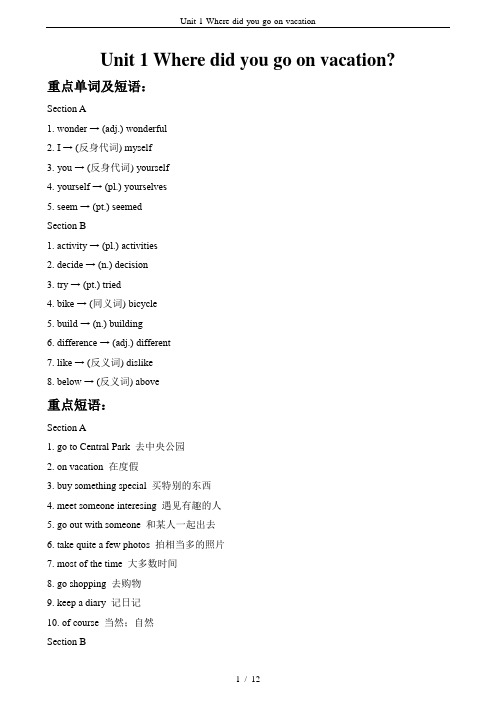
Unit 1 Where did you go on vacation?重点单词及短语:Section A1. wonder → (adj.) wonderful2. I → (反身代词) myself3. you → (反身代词) yourself4. yourself → (pl.) yourselves5. seem → (pt.) seemedSection B1. activity → (pl.) activities2. decide → (n.) decision3. t ry → (pt.) tried4. bike → (同义词) bicycle5. build → (n.) building6. difference → (adj.) different7. like → (反义词) dislike8. below → (反义词) above重点短语:Section A1. go to Central Park 去中央公园2. on vacation 在度假3. buy something special 买特别的东西4. meet someone interesing 遇见有趣的人5. go out with someone 和某人一起出去6. take quite a few photos 拍相当多的照片7. most of the time 大多数时间8. go shopping 去购物9. keep a diary 记日记10. of course 当然;自然Section B1. have a good time 玩得高兴;过得愉快2. go to the beach 去海滩3. feel like 感觉像4. the houses of the Chinese traders 中国商人的房子5. a lot of new buildings 许多新的建筑物6. in the past 在过去7. over an hour 一个多小时8. too many people 太多的人9. get to the top 到达顶部10. because of the bad weather 因为不好的天气11. one bowl of fish 一碗鱼肉12. another two hours 另外两个小时13. the top of the hill 山顶14. learn something important 学习重要的东西Self Check1. go to the countryside 去乡下2. in the shopping center 在购物中心3. have a fun time 玩得高兴;过得愉快4. after three hours 三个小时以后5. keep going 一直走6. twenty minutes later 20分钟后重点句子:1. Where did you go on vacation?你去哪儿度假的?2. Long time no see.好久不见。
Unit1WhereIlive教材分析
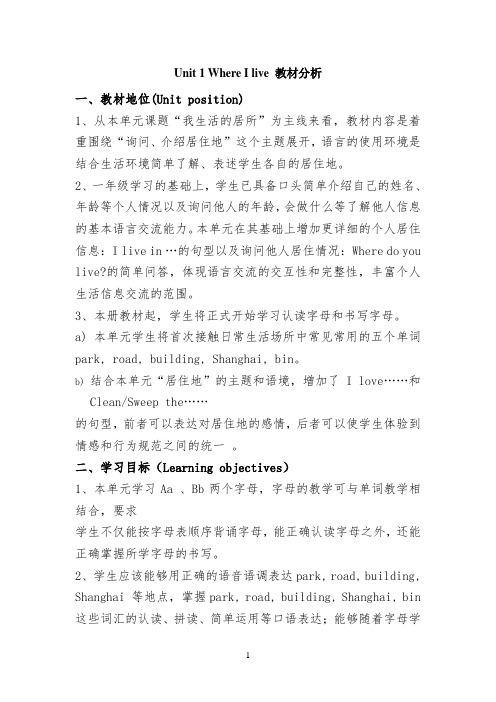
Unit 1 Where I live 教材分析一、教材地位(Unit position)1、从本单元课题“我生活的居所”为主线来看,教材内容是着重围绕“询问、介绍居住地”这个主题展开,语言的使用环境是结合生活环境简单了解、表述学生各自的居住地。
2、一年级学习的基础上,学生已具备口头简单介绍自己的姓名、年龄等个人情况以及询问他人的年龄,会做什么等了解他人信息的基本语言交流能力。
本单元在其基础上增加更详细的个人居住信息:I live in …的句型以及询问他人居住情况:Where do you live?的简单问答,体现语言交流的交互性和完整性,丰富个人生活信息交流的范围。
3、本册教材起,学生将正式开始学习认读字母和书写字母。
a) 本单元学生将首次接触日常生活场所中常见常用的五个单词park, road, building, Shanghai, bin。
b)结合本单元“居住地”的主题和语境,增加了I love……和Clean/Sweep the……的句型,前者可以表达对居住地的感情,后者可以使学生体验到情感和行为规范之间的统一。
二、学习目标(Learning objectives)1、本单元学习Aa 、Bb两个字母,字母的教学可与单词教学相结合,要求学生不仅能按字母表顺序背诵字母,能正确认读字母之外,还能正确掌握所学字母的书写。
2、学生应该能够用正确的语音语调表达park, road, building, Shanghai 等地点,掌握park, road, building, Shanghai, bin 这些词汇的认读、拼读、简单运用等口语表达;能够随着字母学习的进度正确书写单词。
除此之外,可根据学生的实际生活情况在口语学习中适当增加居住地的街道名称或学生较熟悉的城市名称等。
3、据实际情况运用I live in …和I love…表达自己居住情况及对其感情;从而在原来自我介绍口语表达的基础上,能够对个人信息作出更详细的介绍。
Unit 1Where重点词汇. everyone pron

Unit 1 My classmatesWords1.Chinese n.中国人;汉语adj.中国的,中国人的2.first adj.第一(位)的,首要的adv.先;首先3.American n.美国人;美洲人adj.美国的;美国人的;美洲的4.where adv.在哪里,去哪里5.year n.年龄;年6.America n.美国;美洲7.England n.英格兰st adj.最后的,最末的adv.最后,最末9.grade n.年级10.China 中国11.everyone pron.大家;每人12.capital n.首都;省会13.but con.但是,然而14.very adv.很,非常15. big adj.大的16. city n.城市17.small adj.小的18.all pron每个,全体19.from prep.从…来,来自20.about prep.关于21.not adv.不是,没有22.our pron.我们的23.he pron.他Phrases1.first name 名字st name 姓3.be from /come from 来自,从……来4.Class4 Grade7 7年级4班5.welcome to 欢迎来到6.the capital of ……的首都Sentences1.Nice to meet you。
见到你很高兴。
2.Where are you from? 你来自哪儿?3.Hi,are you English too? 嗨,你也是英国人吗?4.This is Lingling and her English name is Lucy 这是玲玲,她的英文名字是露西。
5.I like cycling/riding a bike. 我喜欢骑自行车6.Thank you for your email. 感谢你发的电子邮件7.I don’t like tennis ,because I’m not very good at it . 我不喜欢网球,因为我擅长。
八年级上册Unit-1-Where-did-you-go-on-vacation单元语法知识汇总

Unit 1 Where did you go on vacation?1、be on vacation在度假go on vacation去度假Where did you go on vacation?你去哪里度假?Where were you on vacation?你在哪里度假?2、visit用法visit+人:拜访某人,看望某人visit+地方:参观某地I visited my grandparents last week.上周我去看了我的爷爷奶奶。
She visited the Palace Museum last year.她去年参观了故宫博物馆。
3、去某地、到达某地的表达方式:go to +地方:去某地get to +地方:到达某地arrive in+大地方arrive at+小地方reach+地方go to New York City去纽约I got to Malaysia yesterday.我昨天到达马来西亚。
I arrived in Beijing the day before yesterday.我前天到达了北京。
注意:go home/here/there回家/去这里/去那里get home/here/there到家/到这里/到那里arrive home/here/there到家/到这里/到那里(home/here/there是副词,要去掉to)4、buy +人+物= buy +物for +人:给某人买某物I bought a gift for my sister.=I bought my sister a gift.我给我姐姐买了一个礼物。
5、玩得开心:have fun=have a good/great time=enjoy oneselfhave fun+动词ing形式have a good/great time+动词ing形式Did everyone have a good time?每个人都玩得开心吗?We enjoyed ourselves on the beach.我们在沙滩上玩得很开心。
unit1-where-did-you-go-on-vacation一般过去时用法讲述

人有了知识,就会具备各种分析能力, 明辨是非的能力。 所以我们要勤恳读书,广泛阅读, 古人说“书中自有黄金屋。 ”通过阅读科技书籍,我们能丰富知识, 培养逻辑思维能力; 通过阅读文学作品,我们能提高文学鉴赏水平, 培养文学情趣; 通过阅读报刊,我们能增长见识,扩大自己的知识面。 有许多书籍还能培养我们的道德情操, 给我们巨大的精神力量, 鼓舞我们前进。
四.动词过去式的构成
1. 规则动词的过去式 1)一般情况下,在动词原形后面加-ed。如: stay-stayed停留 2)以不发音e结尾的动词,在词尾直接加-d。 如:arrive-arrived到达 3) 末尾只有一个辅音字母的动词,要先双写 这个辅音字母后,再加 –ed。如stop-stopped 停止 4)以“辅音字母+ y”结尾的动词,先将 y 改为 i, 再加 –ed。如:study-studied学习
口诀:一加ed,二加d,三要双写, 四注意,y变成ied,特殊形式特殊记。
5.本单元重点动词变过去式。 was am(is) are(是) were could do/does(做,干) can(能) did had have (has)(有) go(走) went came feed (喂) come(来) fed bought eat(吃) buy (买) ate grow(生长) grew ride (骑) rode ran run(跑) say (说) said saw see (看见) get(变得,到达)got taught take(带) teach(教) took swim(游泳) swam learn(学习) learned\ learnt met meet(遇见) feel(感觉) felt decide(决定) decidedtry(尽力、尝试)tried drank stop(停止) drink (喝) stopped found tell(告诉) find(找到发现) told
Unit_1_Where_did_you_go_on_vacation?单元知识点和练习题

Unit 1 Where did you go on vacation?一、知识点1. go on (a) vacation 去度假:be on (a)vacation 在度假/take a vacation休假2. go to the mountains去爬山go the beach 去沙滩go to the summer camp 去夏令营3.go+V-ing意为“去…”,多用于进行体育活动和业余娱乐活动,总结:go shopping/ go fishing/ go skating/ go swimming/ go camping/ go boating/ go hiking4. stay vi.停留,逗留,待在stay at home待在家里/ stay up (late)深夜不睡/熬夜5. most pron.大多数Most of后面的名词前要用冠词,人称代词用宾格;做主语时,of后的名词是复数,后面的谓语动词用复数;of后的名词是单数,后面的谓语动词用单数,如:Most of us like learning English. Most of the apples are delicious. / Most of the apple is bad.6. buy sth. for sb.(=buy sb. sth.)给某人买某物,如:I bought a pair of new glasses for my mother.=7. How do you think of….?你认为……怎么样?例如:你认为这个电影/这本书/这个国家/这个故事怎么样?=what do you think of …?/How do you feel about….?8 ed 和ing 结尾的动词9. seem好像,似乎,看起来①主语+seem to do sth. Your father seems to like playing tennis very much.(变否定句)②主语+seem (to be)+adj. The classroom seems (to be) very clean.③It seems +that从句It seems that it will snow soon./ It seems that you are not happy today.10. problem大的问题,难题,需要用行动解决;question因疑惑而提出的,需要口头回答。
八年级上册Unit 1 Where did you go on vacation单元语法知识汇总
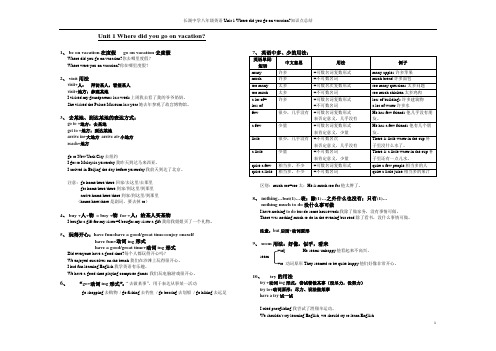
Unit 1 Where did you go on vacation?1、be on vacation在度假go on vacation去度假Where did you go on vacation?你去哪里度假?Where were you on vacation?你在哪里度假?2、visit用法visit+人:拜访某人,看望某人visit+地方:参观某地I visited my grandparents last week.上周我去看了我的爷爷奶奶。
She visited the Palace Museum last year.她去年参观了故宫博物馆。
3、去某地、到达某地的表达方式:go to +地方:去某地get to +地方:到达某地arrive in+大地方arrive at+小地方reach+地方go to New York City去纽约I got to Malaysia yesterday.我昨天到达马来西亚。
I arrived in Beijing the day before yesterday.我前天到达了北京。
注意:go home/here/there回家/去这里/去那里get home/here/there到家/到这里/到那里arrive home/here/there到家/到这里/到那里(home/here/there是副词,要去掉to)4、buy +人+物= buy +物for +人:给某人买某物I bought a gift for my sister.=I bought my sister a gift.我给我姐姐买了一个礼物。
5、玩得开心:have fun=have a good/great time=enjoy oneselfhave fun+动词ing形式have a good/great time+动词ing形式Did everyone have a good time?每个人都玩得开心吗?We enjoyed ourselves on the beach.我们在沙滩上玩得很开心。
Unit1Wheredidyougoonvacation单元教案

(三)实践活动(用时10分钟)
1.分组讨论:学生们将分成若干小组,每组讨论一个与假期旅行相关的问题,如“Where did you go on vacation?”、“What did you do there?”等。
-陈述句:“I went to the beach.”
2.教学难点
(1)一般过去时的运用:学生需要理解并熟练运用一般过去时描述过去的旅行经历,这是本节课的难点。
-难点解析:动词过去式的变化规则,如go-went、visit-visited等。
(2)口语表达:学生在表达过去旅行经历时,可能存在语言组织困难,需要教师引导和辅导。
总体来说,本节课的教学效果达到了预期目标,学生们对一般过去时有了初步的理解和掌握。但在教学过程中,我也发现了以下需要改进的地方:
1.对动词过去式的变化规律进行更多练习,以提高学生的熟练度。ቤተ መጻሕፍቲ ባይዱ
2.在小组讨论环节,增加对学生的引导和鼓励,使更多学生积极参与。
3.在课后作业中,布置一些与实际生活相关的练习,让学生在日常生活中运用所学知识。
二、核心素养目标
《Unit 1 Where did you go on vacation》单元教案,立足学科核心素养目标,关注学生全面发展。具体目标如下:
1.语言能力:培养学生运用英语描述过去旅行经历的能力,提高口语表达和书写能力。
2.思维品质:激发学生思考旅行中的有趣经历,培养逻辑思维和创造性思维。
3.文化意识:通过了解不同旅行地点的风土人情,拓展学生的国际视野,增进跨文化交际意识。
八年级英语上册Unit 1 Where did you go on vacation-知识点归纳

八年级英语上册Unit 1 Where did you go on vacation?知识点归纳八年级英语上册Unit1wheredidyougoonvacation?知识点归纳第一单元主要点:①复习一般过去时②复合不定代词的用法③反身代词的用法④系动词的用法⑤动词后的todo和doing的区别⑥ed形容词和ing形容词的区别⑦“近义词”的区别⑧本单元中的主谓一致现象⑨动词过去式的构成及不规则动词表⑩用同义短语转换同义句时谓语动词形式一致性的培养。
⑾感叹句的结构和连词的选择。
一、词组、短语:1、goonvacation去度假,2、stayathome呆在家,3、gotothemountains上山/进山,4、gotothebeach到海边去,5、visitmuseums参观博物馆,6、gotosummercamp去夏令营,7、quiteafew相当多,8、studyfor为……学习,9、goout出去,10、mostofthetime大部分时间/绝大多数时间,11、tastegood尝起来味道好,12、haveagoodtime玩的开心,13、ofcourse当然可以,14、feellike感觉像……/想要,15、goshopping购物,16、inthepast在过去,17、walkaround绕……走,18、toomany太多(可数名词前面),19、becauseof因为,20、onebowlof一碗……,21、findout查出来/发现,22、goon继续,23、takephotos照相,24、somethingimportant重要的事情,25、upanddown上上下下,26、comeup出来二、重要句子(语法):wheredidyougoonvacation?你到哪里去度假了?IwenttoNewyorkcity.我去了纽约城Didyougooutwithanyone?你出去带人吗?No,Noonewashere.Everyonewasonvacation.不,没有人在这儿。
Unit-1-Where-did-you-go-on-vacation优秀教案

Unit 1 Where did you go on vacation?Section A 1 (1a-2d)一、教学目标:1. 学生能掌握以下单词:anyone, anywhere, wonderful, quite a few, most,something, nothing, everyone, of course, myself, yourself能掌握以下句型:①—Where did you go on vacation? —I went to the mountains.②—Where did Tina to on vacation? —She went to the beach.③—Did you go with anyone? —Yes, I did./No, I didn’t.能了解以下语法:—复合不定代词someone, anyone, something, anything等的用法。
—yourself, myself等反身代词的用法。
一般过去时态的特殊疑问句,一般疑问句及其肯定、否定回答。
2. 学生会用一般过去时进行信息交流,培养学生的环保意识,热爱大自然。
二、教学重难点1. 教学重点:1) 用所学的功能语言交流假期去了哪里旅行。
2) 掌握本课时出现的新词汇。
2. 教学难点:1)复合不定代词someone, anyone, something, anything等的用法。
2) yourself, myself等反身代词的用法。
三、教学过程Ⅰ. Lead-in1. 看动画片来进入本课时的主题谈论上周末做了些什么事情,谈论过去发生的事情。
Ⅱ. Presentation1. Show some pictures on the big screen. Let Ss read the expressions.2. Pay attention to the pictures. Ask: What can you see? Say: Each picture shows what a person did on summer vacation. Name each activity and ask students to repeat: stayed at home, did volunteer work, went to Beijing, went to the beach, visited museums, went to summer campWork on 1a:3. Now, please match each phrase with one of the pictures next to the name of the activity,point to the simple answer.4. Check the answers. Answers: 1. f 2. b 3. g 4. e5. c6. a7. dIII. Listening1. Point to the picture on the screen.T: Look at the picture. Where did Tina go on vacation? She went to the mountains. There are three conversations. The people talk about what they did on vacation. Listen to the recording and write numbers of the names in the right boxes of the picture.2. Check the answers.3. Listen to the conversations again .IV.Pair work1. Point out the sample conversation. Ask two Ss to read the conversation to the class.2. Now work with a partner. Make your own conversation about the people in the picture.3. Ss work in pairs. As they talk, move around the classroom and give any help they need.4. Let some pairs act out their conversations.V. Listening1. Pre-ListeningT: Look at the picture. Where was this girl? Was she in a park? Or was she on the beach?Tell Ss they will hear three students’ conversationsLet Ss read the phrases in the chart of 2b.2. While-listeningWork on 2a: play the recording the first time. Ss listen and fill in the chart.Work on 2b: play the recording the second time for the Ss to check “Yes, I did.” or “No, I didn’t.”Check the answers with the Ss.3. Listen to conversation 1 and fill in the blanks.Grace went to _______________ for her vacation. She went with _____________. She went to Central Park, and she bought _______ for her father.Listen to conversation 2 and fill the blanks.Kevin went to beach for his vacation. He didn’t play __________, but he went ___________. The food tasted really good. And he met some __________________.Listen to conversation 3 and fill in the blanks.Julie stayed at home. She didn’t do anything interesting. She study for ______. Because everyone was on vacation, she _______ go out with anyone.掌握短语:go to the beach去海滩buy sth. for sb.(= buy sb. sth.)taste good尝起来不错stay at home待在家study for tests备考go out 外出(娱乐)VI. Pair work1. Let two Ss read the conversation between Grace, Kevin and Julie.2. Let Ss work in pairs and try to role-play the conversation.A: Grace, where did you go on vacation?B: I went to New York City.A: Oh, really? Did you go with anyone?B: Yes, I went with my mother.3. Ask some pairs to act out their conversations.VII. Reading and Role-play1. First let Ss read the conversation and match the people and places they went.2. Read the conversation and answer the questions.1) Where did Helen go on vacation? She went to Guizhou with her family.2) What did Helen do there? She saw Huangguoshu Waterfall and took quite a fewphotos there.3) What did Rick do last month? He just stayed at home most of the time to readand relax.3. Let Ss act out the conversations in pairs.VIII. Language points1. Did you buy anything special?在英语中,anything, something, nothing和everything是用于指代事物的复合不定代词,与之相对应的复合不定代词anyone, someone, no one和everyone (anybody, somebody, nobody和everybody) 用于指人。
- 1、下载文档前请自行甄别文档内容的完整性,平台不提供额外的编辑、内容补充、找答案等附加服务。
- 2、"仅部分预览"的文档,不可在线预览部分如存在完整性等问题,可反馈申请退款(可完整预览的文档不适用该条件!)。
- 3、如文档侵犯您的权益,请联系客服反馈,我们会尽快为您处理(人工客服工作时间:9:00-18:30)。
Unit1 Where’s your pen pal from?
重点词组
1.pen pal 笔友
2.speak English讲英语
3. be from=come from来自
4.on weekends在周末
5.write to 设备给某人写信
5.live in 居住
7.a little一些
8.likes and dislikes喜欢/不喜欢
9.like doing sth喜欢做某事
10.like to do sth想去做某事
11. tell sb about sth告诉某人关于某事
12.tell sb to do sth告诉某人去做某事
13. talk to/with sb about sth和某人谈话
4.talk of /about sth谈论某事
15. be interesting in对……感兴趣
16.go to the movies=go to the cinema =go to see a film 去看电影
17.hear from sb收到某人来信
一.Where +be+主语+from?=Where +do/does+主语+come from? Where are you from?=Where do you come from?
Be from = come from
联系动词 be实义动词come
例:Stone is come from China.(×)
注:be动词与实义动词永远不能连用。
二.国家国家人国家人复数语言
China Chinese Chinese Chinese
Canada CnadianCanadians English.French
France French Frenchmen French
Japan Japanese Japanese Japanese
American American Americans English
England Englishman Englishmen English
Australia Australian Australians English
三. Where does he live? He lives in Beijing.
Where对地点提问的秘诀是:一定,二改,三组合
一定,确定疑问词Where
二改,将原句改为一般疑问句,将第一人称改为第二人称
三组合,把前面的部分及后面部分组合
例:I live in Kunming(画线提问) Where do you from?
Live是一个不及物动词
及物动词后可以直接加宾语,不需要加任何介词。
不及物动词后不可以直接加宾语,但可以单独使用。
如果想要加宾语,需要加上介词。
四. What language does she speak?
Speak:既可以做及物动词,也可以做不及物动词。
翻译为“说,讲话”做及物动词时,只能接某种语言做宾语。
例:1. He speaks (vt) English.
2 .Mrsister is speaking. (vi)
Say: 翻译为“说,述说”用系统语言表达自己的想法,后面必须跟说话的内容,宾语只能是话语,而不能是人。
例:He says he is a boy.
Tell: 翻译为“告诉,讲述。
”尤其用在讲故事,讲笑话(tell stories/jocks)
Tell sbsth (告诉某人某事) tell sb to do sth(告诉某人做某事)
例:My mother tells me to study well.
Talk: 翻译为“交谈,谈论。
”后面常跟to, with表示与某人谈话。
如果跟about, of表示谈话的内容。
Talk to sb=talk with sb和某人谈话
Talk about sth=talk of sth谈论某事
五.interesting与interested
interesting :指事情本身有趣,意为“有趣的,令人感兴趣的一般修饰物。
Interested:指人对……感兴趣(be interested)
例句:This is an interesting story.
I am interested in learning English.
六.a little 和little
A little:修饰不可数名词,表示肯定含义,意为“有一些,少如:There is little water in Mr. Stone’s cup
Little: 修饰不可数名词,表示肯定,翻译为几乎没有。
如:I know little Japanese
拓展:Many+可数名词复数eg:Many books
Much+不可数名词eg: Much money
Some+可数名词/不可数名词eg:Some book/water
A lot of +可数名词/不可数名词
七.I like gong to the movies with my friends and playing sports. 1.like doing sth/like to do sth喜欢干某事,
2.去看电影
Go to the movies Go to a movie
Go to the cinema Go to see a movie
3.and 和with
And连接两个主语,通常放在句首,其谓语动词复数。
(连词)
with为介词,后面跟名词或代词的宾格,通常放在句末。
Eg: He and I are both students
He lives in China with his parents.
句型
1.Where is your pen pal from?
2.Where does he come from?
3.Does she have brothers or sister?
4.I think China is a very interesting country
5.I can speak English and a little French.
6.I like going to the movies with my friends and playing sports.
7.please write and tell me about yourself.8. It is an action movie。
